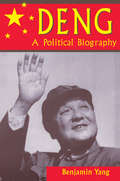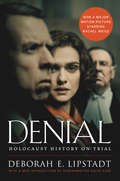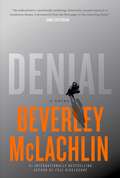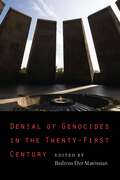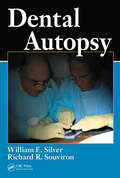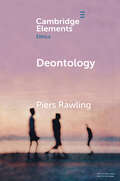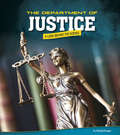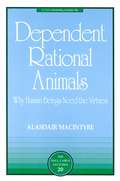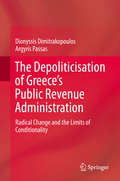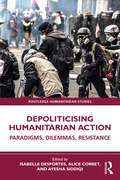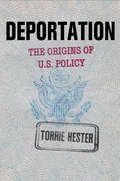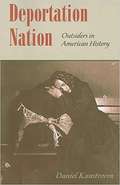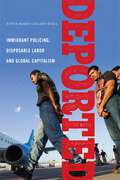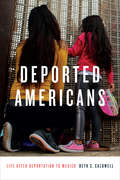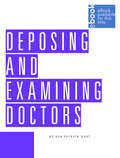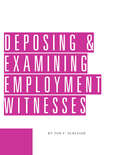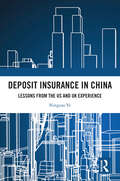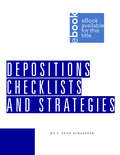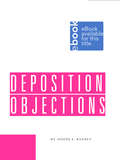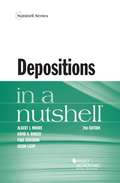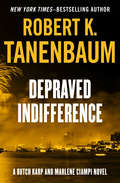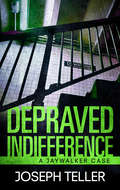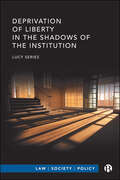- Table View
- List View
Deng: A Political Biography
by Benjamin YangA comprehensive exposition of the life of Deng Xiaoping, the pre-eminent leader of late 20th-century China, from his birth in 1904 to the present. Written by an insider, this study is notable for the detail it provides on elite-level Chinese Communist Party politics and Deng's changing relations with his party colleagues in the jockying for power that constitutes a significant aspect of CCP politics. This biography combines intimate details, and the sweep of history that encompasses the struggles of 20th-century China. This text provides both political and personal information that may be of interest to students of Chinese history, as well as providing an insight into the man who has influenced the social, political, and economic development of China.
Denial: Holocaust History on Trial
by Deborah E. LipstadtNow a major motion picture starring Rachel Weisz, Timothy Spall and Tom Wilkinson. “A compelling book: memoir and courtroom drama, a work of historical and legal import. ” -- Jewish WeekDeborah Lipstadt, author of the groundbreaking Denying the Holocaust, chronicles her six-year legal battle with controversial British World War II historian David Irving that culminated in a sensational 2000 trial in LondonIn her acclaimed 1993 book Denying the Holocaust, Deborah Lipstadt called putative World War II historian David Irving “one of the most dangerous spokespersons for Holocaust denial”, a conclusion that she reached by examining his cunning manipulations of evidence, partisanship to Hitler, persistent exoneration of the Third Reich, and his confirmed celebrity among swelling ranks of anti-Semitic organizations internationally. In 1994, Irving filed a libel lawsuit, not in the U.S. courtroom—where the onus of proof lies on the plaintiff, but in the UK—where the onus of proof lies on the defendant. At stake were not only the reputations of two historians, but the record of history itself.The four-month trial took place in London in 2000 and drew international attention. With the help of a first-rate team of solicitors and historians and the support of her UK publisher, Penguin, Lipstadt won, her victory proclaimed on the front page of major newspapers around the world. Part history, part real life courtroom drama, Denial is Lipstadt’s riveting, blow-by-blow account of the trial that tested the standards of historical and judicial truths and resulted in a formal denunciation of the infamous Holocaust denier.Originally published as History on Trial.
Denial: A Novel (A Jilly Truitt Novel #2)
by Beverley McLachlinCityLine Book Club Pick for September From the former Chief Justice of Canada and #1 bestselling author of Full Disclosure comes a taut new thriller starring tough-as-nails defense attorney Jilly Truitt in a murder case that makes her question her own truths.When everyone is in denial, how do you find the truth? Jilly Truitt has made a name for herself as one of the top criminal defense lawyers in the city. Where once she had to take just about any case to keep her firm afloat, now she has her pick—and she picks winners. So when Joseph Quentin asks her to defend his wife, who has been charged with murdering her own mother in what the media are calling a mercy killing, every instinct tells Jilly to say no. Word on the street is that Vera Quentin is in denial, refusing to admit to the crime and take a lenient plea deal. Quentin is a lawyer&’s lawyer, known as the Fixer in legal circles, and if he can&’t help his wife, who can? Against her better judgment, Jilly meets with Vera and reluctantly agrees to take on her case. Call it intuition, call it sympathy, but something about Vera makes Jilly believe she&’s telling the truth. Now, she has to prove that in the courtroom against her former mentor turned opponent, prosecutor Cy Kenge—a man who has no qualms about bending the rules. As the trial approaches, Jilly scrambles to find a crack in the case and stumbles across a dark truth hanging over the Quentin family. But is it enough to prove Vera&’s innocence? Or is Jilly in denial herself? Thrumming with tension, Denial is a riveting thriller about the lengths we will go to for the ones we love and the truths we hold dear.
Denial of Genocides in the Twenty-First Century
by Bedross Der MatossianThroughout the twenty-first century, genocide denial has evolved and adapted with new strategies to augment and complement established modes of denial. In addition to outright negation, denial of genocide encompasses a range of techniques, including disputes over numbers, contestation of legal definitions, blaming the victim, and various modes of intimidation, such as threats of legal action. Arguably the most effective strategy has been denial through the purposeful creation of misinformation.Denial of Genocides in the Twenty-First Century brings together leading scholars from across disciplines to add to the body of genocide scholarship that is challenged by denialist literature. By concentrating on factors such as the role of communications and news media, global and national social networks, the weaponization of information by authoritarian regimes and political parties, court cases in the United States and Europe, freedom of speech, and postmodernist thought, this volume discusses how genocide denial is becoming a fact of daily life in the twenty-first century.
Denken ohne fachliches Geländer?: Ethik-Unterricht zwischen den Disziplinen (Ethik und Bildung)
by Anne Burkard Laura MartenaDie meisten Ethik-Fächer in Deutschland sind als Alternativ- oder Ersatzfächer für den Religionsunterricht konzipiert. Eine Herausforderung betrifft die Verortung eines Teils dieser Fächer zwischen Philosophie, Religionswissenschaft und weiteren Disziplinen. Am Beispiel des Faches Werte und Normen diskutiert dieser Band Fragen, die sich für alle multidisziplinären Ethik-Fächer stellen: Was bedeutet es für die Konzeption, die Unterrichtspraxis und die Lehrkräftebildung eines Faches, wenn es an mehreren Bezugsdisziplinen ausgerichtet ist? Wie sollten die Bezüge verbunden oder abgegrenzt werden? Welche Konzepte für die Fachentwicklung gibt es?
Dental Autopsy
by William E. Silver Richard R. SouvironThe most advanced and complete forensic dentistry resource of its kind, this volume provides essential guidance in all areas of forensics odontologly. It supplies medical examiners and forensic investigators with the detailed information needed to perform their work with the highest level of authority in the dental autopsy lab, the field, and the c
Deontic Logic and Legal Systems
by Pablo E. Navarro Jorge L. RodrÍguez Eugenio Bulygin Pablo E. Navarro Jorge L. RodríguezA considerable number of books and papers have analyzed normative concepts using new techniques developed by logicians; however, few have bridged the gap between the Continental (i. e. , European) and Latin American traditions in legal philosophy. This book addresses this issue by offering an introductory study on the many possibilities that logical analysis offers the study of legal systems. The volume is divided into two sections: The first covers the basic aspects of classical and deontic logic and its connections, advancing an explanation of the most important topics of the discipline by comparing different systems of deontic logic and exploring some of the most important paradoxes in its domain. The second section deals with the role of logic in the analysis of legal systems by discussing in what sense deontic logic and the logic of norm-propositions are useful tools for a proper understanding of the systematic structure of law. Arguments are provided to stress the relevance of a systematic reconstruction of law as a necessary step in the identification of the truth conditions of legal statements and the reasons for accepting or rejecting the validity of logical consequences of enacted legal norms.
Deontology (Elements in Ethics)
by Piers RawlingDeontology is a theory about how we should act, morally speaking. It comes in several varieties, but all share certain doctrines, many of which are close to those found in the so-called 'common-sense morality' of the Western world. And all varieties are united in their opposition to consequentialism, a theory that, in its simplest form, tells us that we should always act so as to maximize impersonal value by bringing about the best consequences. This Element presents some of the different versions of deontology, including the views of W. D. Ross, and, to a lesser extent, Immanuel Kant. It defends certain deontological tenets, while challenging others, and contrasts them with consequentialism. Deontology and consequentialism are two of the main contenders in ethical theory, but virtue ethics is another, and it too is addressed (briefly), with an attempt to see it, in its most plausible form, as part of deontology.
The Department of Justice: A Look Behind the Scenes (U.S. Government Behind the Scenes)
by Michael BurganDescribes the history of the Department of Justice, and how it has evolved, what the pressing issues are today, and what lies ahead in the near future. Takes a potentially dry topic and makes it accessible for the younger reader. Sidebars highlight important issues and figures in history.
Dependent Rational Animals
by Alasdair Macintyre"MacIntyre--one of the foremost ethicists of the past half-century--makes a sustained argument for the cetnrality, in well-lived human lives, of both virtue and local communities of giving and receiving. He criticizes the mainstream of Western ethics, including his own previous position, for not taking seriously the dependent and animal sides of human nature, thereby overemphasizing the powers of reason and the pursuit of reason and the pursuit of autonomy. . . . This important work in ethics is essential for the professional philosopher and is highly readable for students at all levels and for thoughtful citizens." --Choice
The Depoliticisation of Greece’s Public Revenue Administration: Radical Change and the Limits of Conditionality
by Dionyssis Dimitrakopoulos Argyris PassasThis book analyses the reform of Greece’s public revenue administration promoted by its international lenders under the successive bailout agreements put in place since 2010. In particular, it shows how an integral part of the finance ministry was converted into an independent agency operating largely outside the direct control of the finance minister. The authors focus on the implementation of this major reform and demonstrate the impact of domestic decisions on the increasing specificity of the international lenders’ demands and the concomitant lack of confidence in the Greek political élite’s commitment to the reform package. This book helps readers understand the response to the eurozone crisis (especially, the conditionality of funding), Greece’s reform capacity with a focus on its tax administration, and the expansion of the scope of non-majoritarian institutions in Western democracies.
Depoliticising Humanitarian Action: Paradigms, Dilemmas, Resistance (Routledge Humanitarian Studies)
by Ayesha Siddiqi Isabelle Desportes Alice CorbetIs it ever possible to separate humanitarian action from politics? Drawing on the experience of both practitioners and researchers, this book is an essential guide to the thorny interplay between what are too often considered as separate worlds.The humanitarian sector aims to separate its work from politics, arguing that independence and neutrality are essential in order to gain entry into disaster and conflict settings. Yet, humanitarian claims of non-involvement in politics have also been dismissed as misleading, naive, or counter-productive. In practice, humanitarians find themselves working within political settings on a daily basis. This book investigates the theory behind depoliticisation, the political background and context behind humanitarian action, and the daily dilemmas faced by practitioners walking that fine line between principles and pragmatism. Finally, this book considers the importance of decolonising mainstream understandings of humanitarianism and politics, and of placing understandings from the Global South at the heart of the discussion.Balancing theoretical insights with empirical grounding, field examples, and recommendations for policy and practice, this book is perfect for researchers and students in humanitarian studies, political science, international relations, human rights, development studies, disaster studies, and peace and conflict studies, as well as humanitarian practitioners and policy makers.
Deportation: The Origins of U.S. Policy
by Torrie HesterBefore 1882, the U.S. federal government had never formally deported anyone, but that year an act of Congress made Chinese workers the first group of immigrants eligible for deportation. Over the next forty years, lawmakers and judges expanded deportable categories to include prostitutes, anarchists, the sick, and various kinds of criminals. The history of that lengthening list shaped the policy options U.S. citizens continue to live with into the present.Deportation covers the uncertain beginnings of American deportation policy and recounts the halting and uncoordinated steps that were taken as it emerged from piecemeal actions in Congress and courtrooms across the country to become an established national policy by the 1920s. Usually viewed from within the nation, deportation policy also plays a part in geopolitics; deportees, after all, have to be sent somewhere. Studying deportations out of the United States as well as the deportation of U.S. citizens back to the United States from abroad, Torrie Hester illustrates that U.S. policy makers were part of a global trend that saw officials from nations around the world either revise older immigrant removal policies or create new ones.A history of immigration policy in the United States and the world, Deportation chronicles the unsystematic emergence of what has become an internationally recognized legal doctrine, the far-reaching impact of which has forever altered what it means to be an immigrant and a citizen.
Deportation Nation: Outsiders In American History
by Daniel KanstroomThe danger of deportation hangs over the head of virtually every noncitizen in the United States. In the complexities and inconsistencies of immigration law, one can find a reason to deport almost any noncitizen at almost any time. In recent years, the system has been used with unprecedented vigor against millions of deportees. We are a nation of immigrants--but which ones do we want, and what do we do with those that we don't? These questions have troubled American law and politics since colonial times. Deportation Nation is a chilling history of communal self-idealization and self-protection. The post-Revolutionary Alien and Sedition Laws, the Fugitive Slave laws, the Indian "removals," the Chinese Exclusion Act, the Palmer Raids, the internment of the Japanese Americans--all sought to remove those whose origins suggested they could never become "true" Americans. And for more than a century, millions of Mexicans have conveniently served as cheap labor, crossing a border that was not official until the early twentieth century and being sent back across it when they became a burden. By illuminating the shadowy corners of American history, Daniel Kanstroom shows that deportation has long been a legal tool to control immigrants' lives and is used with increasing crudeness in a globalized but xenophobic world.
Deported: Immigrant Policing, Disposable Labor and Global Capitalism (Latina/o Sociology #6)
by Tanya Maria Golash-BozaWinner, 2016 Distinguished Contribution to Research Book Award, given by the American Sociological Association Latino/a SectionThe intimate stories of 147 deportees that exposes the racialized and gendered dimensions of mass deportations in the U.S.The United States currently is deporting more people than ever before: 4 million people have been deported since 1997 –twice as many as all people deported prior to 1996. There is a disturbing pattern in the population deported: 97% of deportees are sent to Latin America or the Caribbean, and 88% are men, many of whom were originally detained through the U.S. criminal justice system. Weaving together hard-hitting critique and moving first-person testimonials, Deported tells the intimate stories of people caught in an immigration law enforcement dragnet that serves the aims of global capitalism.Tanya Golash-Boza uses the stories of 147 of these deportees to explore the racialized and gendered dimensions of mass deportation in the United States, showing how this crisis is embedded in economic restructuring, neoliberal reforms, and the disproportionate criminalization of black and Latino men. In the United States, outsourcing creates service sector jobs and more of a need for the unskilled jobs that attract immigrants looking for new opportunities, but it also leads to deindustrialization, decline in urban communities, and, consequently, heavy policing. Many immigrants are exposed to the same racial profiling and policing as native-born blacks and Latinos. Unlike the native-born, though, when immigrants enter the criminal justice system, deportation is often their only way out. Ultimately, Golash-Boza argues that deportation has become a state strategy of social control, both in the United States and in the many countries that receive deportees.
Deported Americans: Life after Deportation to Mexico
by Beth C. CaldwellWhen Gina was deported to Tijuana, Mexico, in 2011, she left behind her parents, siblings, and children, all of whom are U.S. citizens. Despite having once had a green card, Gina was removed from the only country she had ever known. In Deported Americans legal scholar and former public defender Beth C. Caldwell tells Gina's story alongside those of dozens of other Dreamers, who are among the hundreds of thousands who have been deported to Mexico in recent years. Many of them had lawful status, held green cards, or served in the U.S. military. Now, they have been banished, many with no hope of lawfully returning. Having interviewed over one hundred deportees and their families, Caldwell traces deportation's long-term consequences—such as depression, drug use, and homelessness—on both sides of the border. Showing how U.S. deportation law systematically fails to protect the rights of immigrants and their families, Caldwell challenges traditional notions of what it means to be an American and recommends legislative and judicial reforms to mitigate the injustices suffered by the millions of U.S. citizens affected by deportation.
Deposing and Examining Doctors
by Kim Patrick HartDeposing and Examining Doctors Some defense doctors try to intimidate you during their depositions. They pretend they don't understand what you are asking, state that you have misused medical terms, and suggest that you don't have an accurate grasp of human anatomy. To be effective, you must know the underlying medicine and have a game plan. Kim Hart's Deposing and Examining Doctors gives you both. This valuable book offers hundreds of pattern questions, dozens of outlines, over 100 practice tips, 8 specialist-written medical chapters, and 79 four-color medical illustrations suitable for enlargement. Each chapter is designed to stand alone so that it can be reviewed quickly in case you need a refresher before taking a doctor's deposition. Even better, review the relevant deposition, trial, and medical chapters when you first accept a case so you understand how to best handle the medical evidence.
Deposing & Examining Employment Witnesses
by Tod F. SchleierTo make it easy for you to prepare for a particular deposition or examination, the book is organized by witness. Each witness-specific section delivers: (1) trial-tested strategies and arguments, (2) model deposition questions specific to cause of action and annotated with tactics, (3) checklists and tactics for direct and cross examinations, with extensive examples sprinkled with practice tips, and (4) summary checklists of the important points that should be inquired into for each cause of action. Tools and advice are provided for both employee and management attorneys. Mastering the art of questioning employment witnesses is a career-long process. It can take dozens of years in the courtroom to learn how to persuasively: (1) demonstrate that reasonable economists can disagree, (2) compel an adverse witness to ratify your position, and (3) contradict a manager or plaintiff on an important fact. Tod Schleier's Deposing & Examining Employment Witnesses will take years off your learning curve. It is filled with practical strategies, examples, tactics, and tips for successful questioning and other essential elements of employment advocacy:
Deposit Insurance in China: Lessons from the US and UK Experience
by null Ningyao YeThis book examines and compares the rationale, design, and implementation of deposit insurance in the US, the UK, and China, with the aim of finding an effective solution for China's nascent deposit insurance scheme by learning from the US and UK models.Deposit insurance, a pillar of the financial safety net that protects insured deposits and serves as a guarantee against losses on insured accounts, has become increasingly important in bank resolution. Using a comparative and interdisciplinary approach, this book examines the legal and regulatory issues surrounding deposit insurance schemes in three jurisdictions – the US, the UK, and China. It offers a timely analysis of the operating mechanisms and implications of deposit insurance during the global financial crisis. It also provides an in-depth doctrinal analysis of the US, the UK, and China's deposit insurance laws. Based on these discussions, the author proposes suggestions for reforming China's deposit insurance system and practice.The title will appeal to scholars and students of banking and banking law as well as legal and financial practitioners in the fields of commercial law and banking and financial regulation.
Deposition Checklists & Strategies
by T. Evan SchaefferHundreds of pattern questions for treating physicians, corporate representatives, insurers, lay witnesses, defendants, and others. Annotated with strategic suggestions, pitfalls to avoid, and bonus discovery forms. 1,000's of deposition questions are supported with strategy, law, practice tips, and thumbnail deposition outlines. Troublesome answers are annotated with commentary and follow-up questions. Covers auto accidents, premises liability, products liability, medical malpractice, employment discrimination and termination, and insurance coverage disputes.
Deposition Objections
by Joseph A. Ranney<p>This handy softcover guide provides the grounds and language for: attorney-client privilege, attorney work-product privilege, proprietary and confidential information, witness self-incrimination, family communications privileges, privileges for communications with professionals, privacy privilege, legal process privilege, over-broad and burdensome questions, vagueness, ambiguity, repetition, lack of foundation, legal conclusions, and more. <BR>Verbal and non-verbal coaching of the witness <br>Colloquies and stipulations among counsel <br>Instructing the witness not to answer <br>Disruptive or inappropriate objections <br>Production of privileged or confidential documents <br>Perhaps because depositions are as close to a trial as many cases will get, deposition disputes have grown more heated and difficult to resolve. <P>Here is a portable and affordable volume that provides practical guidance for resolving many of the more contentious disputes.
Depositions In A Nutshell
by Albert Moore David Binder Paul Bergman Jason LightThis Nutshell, which replaces Binder, Moore and Bergman's Deposition Questioning Strategies and Techniques (2001), provides comprehensive descriptions and concrete illustrations of effective strategies and techniques for taking and defending depositions. The book can serve as a text for a 2-4 unit stand-alone depositions course (either live client or simulated) or as a supplement to a civil pre-trial lawyering course. It devotes separate chapters to such fundamental skills as obtaining helpful answers to critical questions, undercutting harmful testimony, obtaining a deponent's version of significant events, and obtaining information from evasive deponents. Other chapters include topics such as responding to inconsistent or implausible testimony, overcoming opposing counsel's objections and obstructionist tactics, and preparing a client to be deposed.
Depraved Indifference: No Lesser Plea, Depraved Indifference, And Immoral Certainty (Butch Karp and Marlene Ciampi #2)
by Robert K. TanenbaumA prosecutor defies the FBI, CIA, and Mafia to bring terrorists to justice in this thriller from the New York Times–bestselling author of Justice Denied. After hijacking a flight to Milwaukee, a group of Croatian terrorists inform the FBI of bombs they&’ve planted across the country. If their demands are not met, the bombs will explode. The plan goes perfectly until one of the weapons goes off in the Bronx, killing a police officer—in assistant district attorney Butch Karp&’s jurisdiction. Prosecuting a few terrorist cop killers should be a slam-dunk, but Karp and his assistant, Marlene Ciampi, are getting resistance from unexpected quarters—including the NYPD itself. The Archdiocese of New York hires a top lawyer to defend the accused. And when the FBI, CIA, and Miami Mafia team up to undermine the case, it&’s clear these Croatians are no ordinary terrorists. As Karp and Ciampi uncover powerful ties, and secrets that reach from anticommunist Cuba to Nazi war crimes, they realize their fight for justice has become a fight for their lives. From the New York Times–bestselling author and former Manhattan assistant district attorney, Depraved Indifference is an insider&’s &“damning indictment of our court system and an entertaining exposé of the DA's office&” (Publishers Weekly). This ebook features an illustrated biography of Robert K. Tanenbaum including rare photos from the author&’s personal collection.
Depraved Indifference
by Joseph Teller"I love the dry wit of Teller's work. Nelson Demille meets Turow or Grisham!" --Goodreads review of Overkill A Jaywalker Case: Book 4 (originally published in 2011) It was a court-appointed case, and Jaywalker knew going in that his client was guilty of the drug deal he'd been arrested for. But there are degrees of guilt, as Jaywalker knew all too well from personal experience. Sometimes people made the wrong move for the right reason, and it was the degree of Alonzo Barnett's guilt that would drive Jaywalker's defense strategy. If that strategy failed, Alonzo, an otherwise-redeemed ex-con, would be back in prison for years. And that was an outcome Jaywalker couldn't stomach, not when his belief in his client was unshakable and the right verdict could lead to redemption for them both. Don't miss a single one of Joseph Teller's award-winning Jaywalker novels: The Tenth Case Bronx Justice Depraved Indifference Guilty as Sin Overkill
Deprivation of Liberty in the Shadows of the Institution (Law, Society, Policy)
by Lucy SeriesePDF and ePUB available Open Access under CC-BY-NC licence. During the 20th century the locus of care shifted from large institutions into the community. However, this shift was not always accompanied by liberation from restrictive practices. In 2014 a UK Supreme Court ruling on the meaning of ‘deprivation of liberty’ resulted in large numbers of older and disabled people in care homes, supported living and family homes being re-categorized as ‘detained’. Placing this ruling in its social, historical and global context, this book presents a socio-legal analysis of social care detention in the post-carceral era. Drawing from disability rights law and the meanings of ‘home’ and ‘institution’ it proposes solutions to the Cheshire West ruling’s paradoxical implications.
